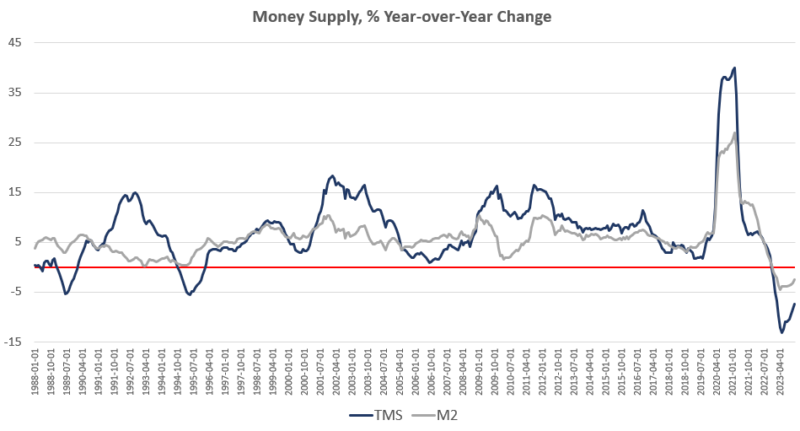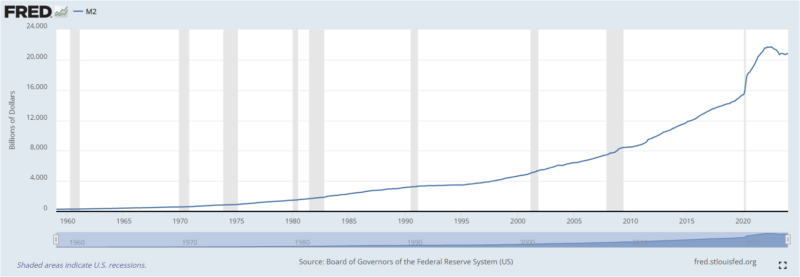Category Archive: 6b) Austrian Economics

The Money Supply Fell for the Fifteenth Month in a Row as Full-Time Jobs Disappear
Money supply growth fell again in January, remaining deep in negative territory after turning negative in November 2022 for the first time in twenty-eight years. January's drop continues a steep downward trend from the unprecedented highs experienced during much of the past three years.Since April 2021, money supply growth has slowed quickly, and since late 2022, we've been seeing the money supply repeatedly contract, year over year. The last time...
Read More »
Read More »
Looking Back at the Crossroads: Liberty or Socialism
Ludwig von Mises begins his book Bureaucracy by declaring that the main issue facing the West in his time was whether man should surrender his liberty to the “gigantic apparatus of compulsion and coercion, the socialist state.” He rephrases: “Should [man] be deprived of his most precious privilege to choose means and ends and to shape his own life?”This question is imminently pressing in the modern day as well, save that we in the West, eight...
Read More »
Read More »
New Video: A Lecture on State Militias and the Second Amendment
Power & Market offers a contrarian take on world events. We favor individual freedom, honest history, and international peace, in the tradition of Ludwig von Mises and Murray N. Rothbard. Connect to Power & Market via Twitter and RSS.Power & Market is published CC4, unless denoted otherwise.
Read More »
Read More »
Bureaucracy: Applying Mises’s Insights to Our Present Day
Human prosperity, contrary to the beliefs of those fanatically obsessed with viewing the government as a savior of humanity, is not guaranteed. For the vast majority of its existence, mankind was impoverished, only recently experiencing unprecedented levels of prosperity and flourishing. This recent state of affairs is not guaranteed to go on forever; its growth could be halted or it could regress the world back to widespread impoverishment if...
Read More »
Read More »
Free Markets and the Antidiscrimination Principle
Tu ne cede malis, sed contra audentior ito
Website powered by Mises Institute donors
Mises Institute is a tax-exempt 501(c)(3) nonprofit organization. Contributions are tax-deductible to the full extent the law allows. Tax ID# 52-1263436
Read More »
Read More »
The Great Depression and Great Depression II: Similarities, Differences
Tu ne cede malis, sed contra audentior ito
Website powered by Mises Institute donors
Mises Institute is a tax-exempt 501(c)(3) nonprofit organization. Contributions are tax-deductible to the full extent the law allows. Tax ID# 52-1263436
Read More »
Read More »
The Folly of Rent Control in New York City (Again)
Tu ne cede malis, sed contra audentior ito
Website powered by Mises Institute donors
Mises Institute is a tax-exempt 501(c)(3) nonprofit organization. Contributions are tax-deductible to the full extent the law allows. Tax ID# 52-1263436
Read More »
Read More »
Be on the Lookout for These Lies in Biden’s State of the Union Address
Tu ne cede malis, sed contra audentior ito
Website powered by Mises Institute donors
Mises Institute is a tax-exempt 501(c)(3) nonprofit organization. Contributions are tax-deductible to the full extent the law allows. Tax ID# 52-1263436
Read More »
Read More »
Understanding the AI Revolution
Tu ne cede malis, sed contra audentior ito
Website powered by Mises Institute donors
Mises Institute is a tax-exempt 501(c)(3) nonprofit organization. Contributions are tax-deductible to the full extent the law allows. Tax ID# 52-1263436
Read More »
Read More »
Separating Information from Disinformation: Threats from the AI Revolution
Tu ne cede malis, sed contra audentior ito
Website powered by Mises Institute donors
Mises Institute is a tax-exempt 501(c)(3) nonprofit organization. Contributions are tax-deductible to the full extent the law allows. Tax ID# 52-1263436
Read More »
Read More »
No, There Is Not a Perfect Open Border System between the States
Tu ne cede malis, sed contra audentior ito
Website powered by Mises Institute donors
Mises Institute is a tax-exempt 501(c)(3) nonprofit organization. Contributions are tax-deductible to the full extent the law allows. Tax ID# 52-1263436
Read More »
Read More »
The Economics of the AI Revolution
Tu ne cede malis, sed contra audentior ito
Website powered by Mises Institute donors
Mises Institute is a tax-exempt 501(c)(3) nonprofit organization. Contributions are tax-deductible to the full extent the law allows. Tax ID# 52-1263436
Read More »
Read More »
A Tale of Two Bureaucracies
Ludwig von Mises is known for his theory of the business cycle and his development of praxeology, but he is best known for discrediting socialism. This critique is found in Economic Calculation in the Socialist Commonwealth (Mises 1990) and Socialism: An Economic and Sociological Analysis (Mises 1951). In a similar vein is a work written near the end of the Second World War: Bureaucracy (Mises 1944). Mises observed shifts away from the market...
Read More »
Read More »
Bureaucracy and Grove City College: How One College Resisted the Bureaucratization of Higher Education
In the last section of his Bureaucracy, Ludwig von Mises laments the loss of the “critical sense” that protected people from authoritarianism (Mises 1944, 108). According to Mises, this was the fault of the bureaucratization of education, which taught students falsehoods, especially in economics (Mises 1944, 82). A prime example was the academic class in the German Empire, which formed an “intellectual bodyguard” (Mises 1944, 82) of the empire’s...
Read More »
Read More »
Haiti, Jimmy Barbeque, and Uncle Sam
Tu ne cede malis, sed contra audentior ito
Website powered by Mises Institute donors
Mises Institute is a tax-exempt 501(c)(3) nonprofit organization. Contributions are tax-deductible to the full extent the law allows. Tax ID# 52-1263436
Read More »
Read More »
Milei’s First One Hundred Days: An Assessment
Javier Milei, presiding over Argentina, the first libertarian president in history – self-proclaimed anarcho-capitalist- has warranted worldwide attention and cast light over libertarianism around the globe. Libertarianism has become more widespread since he entered the political scene. This comes with a definitely positive side and a more dangerous one. The positive side is obviously that libertarianism is more popular than before.The dangerous...
Read More »
Read More »
CNN Is Wrong. Deflation Is a Good Thing
A recent video by CNN states that lower prices are bad for the United States economy and that consumers must get used to the newer, higher prices. The video goes so far as to say, “We’re never going to pay 2019 prices again.” The video claims that deflation is responsible for a long list of problems including layoffs, high unemployment, and falling incomes. Americans should simply get used to paying more and more each year and be happy about it....
Read More »
Read More »
How State Intervention Fueled Haiti’s Descent into Chaos
As the internationally recognized government in Haiti loses its grip on power, the small Caribbean country is descending into violence. The media reports about the situation are quick to, either implicitly or explicitly, place the overall blame for the violence on the absence of state institutions.Situations like this are often used to dismiss libertarians. Before Haiti, it was Somalia that experienced a so-called stateless period in the 1990s and...
Read More »
Read More »
Is the Violence in Haiti a Preview of a Libertarian Society?
As the internationally recognized government in Haiti loses its grip on power, the small Caribbean country is descending into violence. The media reports about the situation are quick to, either implicitly or explicitly, place the overall blame for the violence on the absence of state institutions.Situations like this are often used to dismiss libertarians. Before Haiti, it was Somalia that experienced a so-called stateless period in the 1990s and...
Read More »
Read More »
Tapping 401ks to Pay the Bills
For lower income folks the landing is already hard. Chief investment strategist at Charles Schwab Liz Ann Sonders posted on X (and reported by Almost Daily Grant’s) that the tally of domestic temporary help employees slipped to a three-plus-year low of 2.748 million down from 3.181 million as of March 2022. The 14% comes in 4th in the category’s downward drops percentage-wise since 1990; to the early 2000s, the 2008 financial crash and the Covid...
Read More »
Read More »
























